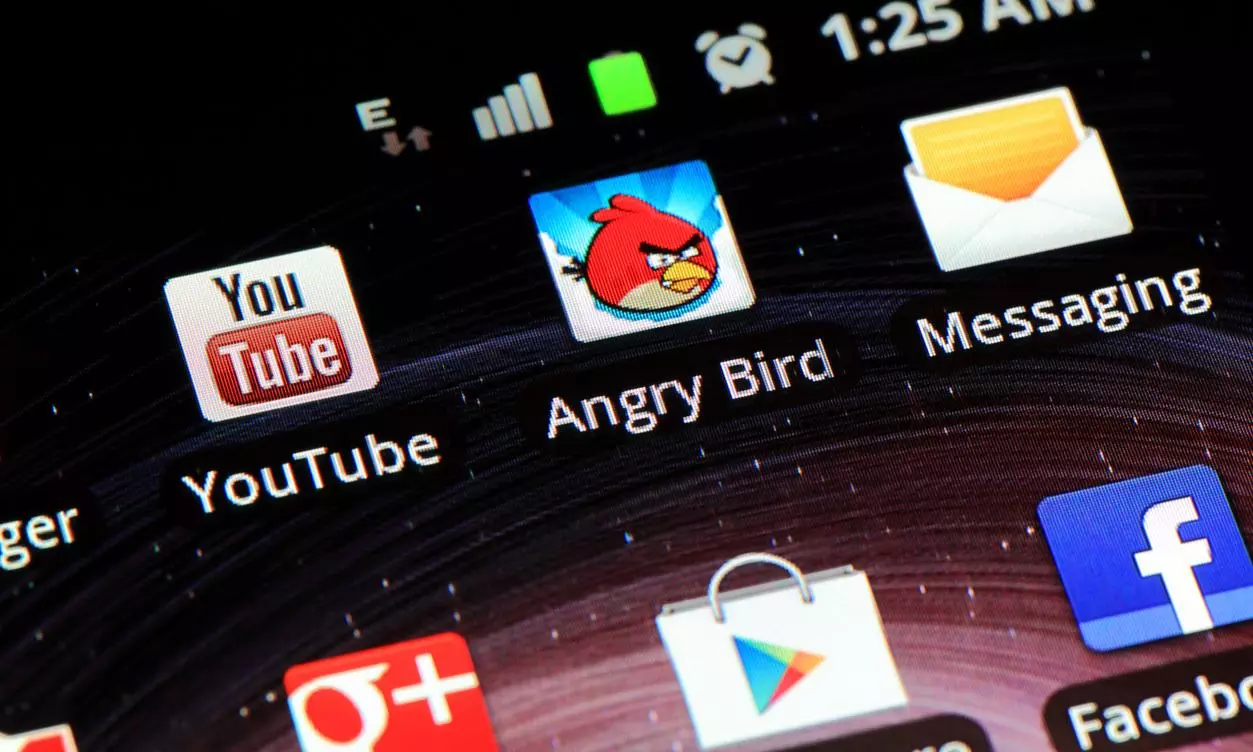
- Home
- News
- Analysis
- States
- Perspective
- Videos
- Education
- Entertainment
- Elections
- World Cup 2023
- Features
- Health
- Business
- Series
- Economy Series
- Earth Day
- Kashmir’s Frozen Turbulence
- India@75
- The legend of Ramjanmabhoomi
- Liberalisation@30
- How to tame a dragon
- Celebrating biodiversity
- Farm Matters
- 50 days of solitude
- Bringing Migrants Home
- Budget 2020
- Jharkhand Votes
- The Federal Investigates
- The Federal Impact
- Vanishing Sand
- Gandhi @ 150
- Andhra Today
- Field report
- Operation Gulmarg
- Pandemic @1 Mn in India
- The Federal Year-End
- The Zero Year
- Premium
- Science
- Brand studio
- Home
- NewsNews
- Analysis
- StatesStates
- PerspectivePerspective
- VideosVideos
- Entertainment
- ElectionsElections
- Sports
- Loading...
Sports - Features
- BusinessBusiness
- Premium
- Loading...
Premium

Play Store fee may be steep, but it's levied only on apps with revenue of at least $1 million; fledgling startups pay little, and Google should publicise this
Richie Rich used to be a 1960s Harvey Comics character, in the company of Little Dot, Little Lotta and Little Audrey in the town, and, in faraway Enchanted Woods, of Casper the Friendly Ghost and Wendy the Good Little Witch.
Richie Rich has weathered the passage of time better than the rest, thanks, probably, to his tagline, The Poor Little Rich Boy. Everyone loves to hate the stereotype of the mean, arrogant, miserly Scrooge. Everyone also loves his dreamworld counterpart, the kind-hearted, benevolent, handsome, do-gooding, Poor Little Rich Boy.
India has been afflicted, recently, by an infestation of would-be Richie Riches. One lot comprises darlings of fintech and edutech who complain loudly to whoever is willing to lend a sympathetic ear of being put upon by geriatric regulators, who just don’t understand the wonder they make.
Another set of poor little rich boys are dollar millionaires, who want to ride the wave of popular, anti-Big Tech sentiment around the world, and pay a few dollars less than what the likes of Google demand as fees for the services they provide.
Google’s delisting
Yes, we are referring to the recent episode of Google delisting some apps from its Play Store for sustained refusal to pay the fees they are supposed to, on digital sales proceeds.
At the outset, it must be clarified that I consider the 30 per cent fee Google levies on digital goods sold on its Play Store apps and 15 per cent on subscriptions to be excessive, and deserves to be brought down. But this fee must be seen in context.
For one, the full fee is levied only on apps that generate a revenue of at least $1 million. Young, struggling startups pay little. Google should make efforts to make its graded fee structure more widely known.
Pricing model
For another, the pricing model, in which Google recovers its costs plus a margin from a fraction of the apps hosted on its Play Store, helps spread mobile-phone use to the poorest corners of the world.
What are Google’s costs? It has to maintain the Play Store, where apps are hosted, keep it sanitised, free from malware of increasing sophistication.
Let us also admit that it costs money to keep the Android operating system going, constantly upgraded to guard against evolving security threats and to accommodate and enable the rising technological sophistication of the apps that run on the platform.
Google dominance
It is not altruism that drives Google to make its operating system available, free of charge, to all phone makers, save some Chinese companies barred by the US government on national security grounds.
Google’s primary purpose of making Android available free of charge is to protect its dominance of search. In return for obtaining a sophisticated, secure operating system for its phones free of charge, phone-makers have to pre-install Google Search and certain other Google-built apps on their phones.
The cost of producing, maintaining and upgrading Android is more than recovered, it could be argued, from its revenue from the advertisements, the sponsored links, that accompany search results.
Cheap phones
So, free Android is a business model. But it is a business model that has helped keep the cost of mobile phones down. Suppose Google had chosen to license Android for a fee that recovers its costs and generates a return, the result would have been to add to the cost of every phone.
Or, Google could have chosen the path Apple has taken, of keeping its sophisticated operating system to itself and producing only high-end phones. iPhones are expensive and have contributed, more than any other product in Apple’s portfolio of tech offerings, to its status as the world’s most valuable company.
Google’s choice of business model has helped billions of people to become owners of smartphones. This, in turn, has produced network effects that benefit everyone on the network. This network of people using smartphones underpins the entire world of digital business in a country like India, where the default mode of accessing broadband is via the mobile phone.
Play Store fees
Google’s reliance on fees generated by Play Store to supplement its search income is only slated to rise.
Search faces enhanced competition, most crucially from artificial intelligence robots like ChatGPT. Right now, these can be delusional, on occasion, making their answers less than reliable. But that might be a passing phase as AI gets better and better.
So, if pre-installed Google Search and the pre-installed Chrome browser with Google as its default search engine no longer drive advertising revenue as in the past, Google might look to Play Store fees as a vital source of revenue.
Monopoly dominance
Now, unlike Apple, Google does allow apps from non-Google app stores to be installed on phones running its operating system. But users install apps on their phones from third party app stores at their own risk. Some of these app stores, such as from Samsung, might be reliable. But there is no guarantee of security for the vast majority of such app stores.
Google also permits billing and payment systems other than that of its Play Store to be used by app developers, but charge a fee, nevertheless.
That leaves Google in a position of near-monopolistic dominance of the market for billing on the apps it hosts on Play Store, in the market for hosting apps for download on to Android phones, and the market for operating systems. Google cannot expect to be exempt from the ambit of the competition regulator in any market.
Regulators’ role
The regulator would have to take into account not just the market for app-based payments, and app downloads, but also the market for operating systems, whose costs are subsumed, admittedly in a fuzzy manner, in the fees levied on app billing and app-based purchases.
Poor little rich boys seek to paint Google as a giant octopus with numerous tentacles that snake out, grab and wring the lifeblood out of victims like them. They would like the public and the regulators to not notice that but for Google’s business model of making a sophisticated operating system for smartphones available cost-free, they would not have much of a business, in the first place.
Rich aren’t poor
Regulators, the courts and the phone-using public at large should see the full picture.
Google, on its part, should appreciate that its arbitrary fee of 30 per cent of digital sales on its apps, even if levied only on the most lucrative apps, is excessive, and should proactively bring it down, while publicising the fact that most startups pay nothing for their use of the Play Store and the Android operating system.
Poor little rich boys exist in fiction, and that, too, as comic characters. Real-world corporate grandees who present themselves as poor little rich boys and seek to pad their already fat profit margins with savings on their platform fees should not end up morphing regulator-shorn bits of sales fees into a licence fee for the operating system, which pushes up the cost of phone ownership.
That would make poor little rich boys gain at the expense of the poor, rather than of Big Tech.



